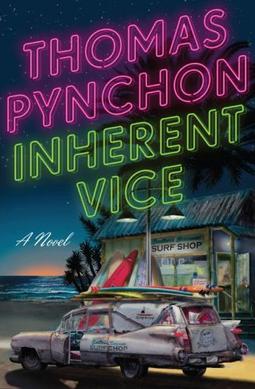Thomas Pynchon

There are some things you can pretty safely expect to come across in a Thomas Pynchon novel -- hilarious character names, irreverent songs, staggering levels of research, perhaps a reference or two to 'magenta and green'... the list goes on. One could say, though, that there's a lot about the content of each work that's nevertheless pretty distinctive and unique amongst his canon. For example, debut novel V. intersperses a satire on New York bohemia with one character's obsessive search for an elusive historical constant known as 'V'; Mason & Dixon takes the real historical figures of Charles Mason and Jeremiah Dixon and places them within a beautifully strange ghost story about the growth and development of the Age of Reason; and Vineland deals, broadly speaking, with its protagonist's complicated relationship with his estranged wife, his daughter, and the federal government.
At first, then, it may seem quite strange that Inherent Vice seems - in many ways - to be very similar to 1990's Vineland. Both novels explore the end of the ''60s dream' at the hands of an ever-growing and restrictive regime of authoritarianism; and they both present a drugged-up, surf-rock-soundtracked California as perceived by stoner protagonists. But, where Vineland flicked channels through tones and themes as diverse as political satire, melancholy nostalgia, eclectic cultural referencing, apparent zombies, and Godzilla; Inherent Vice sticks more-or-less to being a weed-reeking mystery novel reminiscent to varying extents both of the Coen Brothers' slacker-noir classic The Big Lebowski and the chaotic, atmospherically rich hardboiled crime novels of someone like Raymond Chandler (himself, of course, a huge influence on the Coens' film). That's certainly not to say, though, that Inherent Vice is - as some critics have argued - a depthless pulp detective pastiche.
The story - of private detective Doc Sportello being hired by his ex-girlfriend and subsequently finding himself dragged into the middle of a Chandler-esque mess of criminals, corrupt police / feds, and shadowy organisations - is presented to the reader in a way that will certainly be familiar to anyone who's read Pynchon before (and if you've not; then this is a great starting point).
The way Pynchon portrays the time period (beginning of the '70s), particularly, is in keeping with his post-modern brand of 'historiographic metafiction' (what a term): he, as ever, acknowledges that history is always constructed from the artefacts of the past through eclectic references to contemporary television, film, and music. Most interesting, though, is how Pynchon once again uses a historical setting to engage with the present day: the ubiquitous problems posed by gentrification are approached in a similar way to those of the colonialism that haunts his more sprawling historical works; the World Wide Web (and issues of privacy and censorship) is explored through its academic / government research-based precursor, ARPANET; and parallels can be drawn between Pynchon's representation of a paranoid post-Manson rise in restrictive authoritarianism and the post-9/11 'War on Terror'...
... Which would seem to lead quite nicely onto Pynchon's most recent novel Bleeding Edge (expect a post about it at some point). Anyway: overall, I found that - for a novel that's received some derision for being 'Pynchon-lite' - Inherent Vice was still rich in the detail, the silliness, and the seriousness that one can expect from one of Pynchon's works. It may be his most accessibly written, and it may not scale the same dizzying heights of ambition as Mason & Dixon or Gravity's Rainbow, but it's no less worthy of a place within the canon of one of the most unique and brilliant writers still working today.